The Path to Acceptance
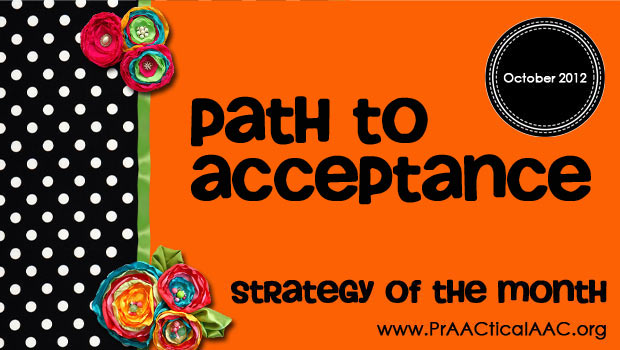
“Attitude is a little thing that makes a big difference”- Winston Churchill
October’s Strategy of the Month focuses on Acceptance of AAC. There is always a path to acceptance of new ideas, new situations, or even new science. Even though AAC strategies and concepts are by no means new, they are often different from the ‘norm’ (whatever that is). We know that the path to acceptance is often filled with obstacles.
In AAC, The Participation Model (Beukelman & Mirenda, 1988) delineates two main barriers to successful implementation. There are opportunity and access barriers. Opportunity barriers to participation are those imposed by people in the environment of the AAC user, while access barriers are present based on issues related to the individual who uses AAC.
It seems that in the last several school and community visits, we have noticed a high degree of opportunity barriers which relate to attitude. The attitude barriers we have seen appear to be related to common myths associated with the use of AAC.
It seems like we have been in a tunnel filled with the following barrier statements and meanings. We also included what we might like to say (and sometimes did) but also real solutions. If the attitude barriers continue though, AAC may just need a Positive PR Campaign….
| Statement | Attitude Barrier | Attitude Adjusters- Quips and Possible Solutions |
| “Since he can speak we really just want to try and go for that” | Natural speech is somehow better than AAC language. | Really?? What about communication and language? Information about the benefits of AAC to natural speech and language. |
| “We don’t want her to get lazy” | Effort is the problem not motor or language issues. | Would you talk to me if maximum effort did not give you results on a consistent basis? Discuss research shows that introduction of AAC improves natural speech when possible and when not certainly improves language skills. |
| “My goal for this student is for him to speak” | Natural speech is the only way to really communicate. | Would you rather someone say a few words with difficulty or have robust communication and language? Discussion and provide information about authentic robust language. |
| “I don’t want him to become dependent on extraneous things” | Not understanding the meaning of dependence. | Would you rather have dependence on a person? Discussion and examples about the meaning of dependence. |
| “We do not want to give too many symbols at once since the students don’t really know them yet” | There are pre-requisites learning skills to AAC. | How would you learn a language if you only had access to hearing and using a few words? And to top it off no one spoke to you in that language. Typical language is provided as a robust system. Visual language needs to be taught in its entirety. |
Check out these great resources that will help give you evidence-based information to dispel myths about AAC (AAC Way of Thinking by SET BC- 2003; Does AAC Impede Natural Speech, by YaacK)
“A positive attitude causes a chain reaction of positive thoughts, events and outcomes. It is a catalyst and it sparks extraordinary results”.- Wade Boggs
Filed under: Strategy of the Month
Tagged With: AAC Acceptance, AAC Awareness, myths
This post was written by Robin Parker

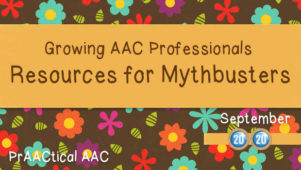
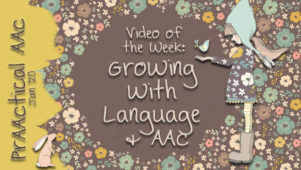
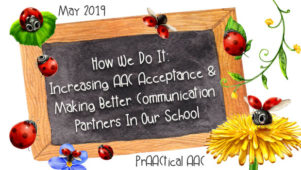
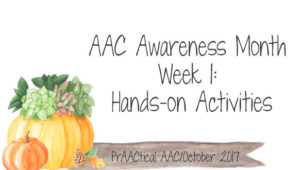
3 Comments
A big thank-you to you, Carol Z,, Tina and Sharla, who have encouraged and reminded me of all the truly wonderful tools that are out there. I plan to print out a large colorful copy of this month’s strategy, to use to remind parents and classroom teachers that AAC is here to stay, so let’s embrace it and use it to facilitate our students’ desire to communicate with us. I took Carole’s workshop this past June and found it to be very informative. I will continue to keep in the loop, each month, so I can apply the different strategies with the students I am working with. Thank you ladies !!!!!!
Phyllis, thank YOU for doing the hard work of AAC each and every day. It may not be as glamorous as doing an MBS or as sexy as voice therapy for professional singers, but what AAC therapists do has them all beat in terms of making a powerful difference in the lives of a very vulnerable populations. Thanks for your kind words about the workshop. Headed our tomorrow to do another one. Hope to meet some new AAC folks up in Jacksonville!